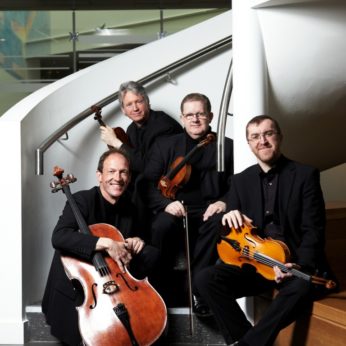Dvorák’s music has no profundity. He does not, as Bruckner, dig into the depths of his soul to bring forth an adagio. Everything came too easily to him. One can see it in the last quartets, he tossed them off as he did with the first quartets. Though he equips them more richly here and there, no more challenging problematic of counterpoint or ideas commands his attention. He does not strive to go beyond the beautiful, harmonious sound and a healthy reality. Robert Hirschfield, Vienna, 1904
Dvorák has had a rough ride from the critics, more or less in inverse proportion to his popularity with audiences. Writers like Adorno considered that Dvorák’s immediacy and trouble-free accessibility deprived music of its redemptive spiritual power. Such critics felt music needed to rouse and inspire the audience as in Wagner’s generation or to make them critical and uncomfortable as in Schönberg’s generation. Even the contemporary writer, who delighted in finding in Dvo?ák’s music compelling alternatives to academic formalism, romantic excess and the desire to achieve profundity, never argued that his gift for natural melodic beauty was integrated with the formal depth of Beethoven or Brahms.
Dvorák came from humble peasant stock and was completely unspoilt by his enormous public success. On his return from America, he spent four months idling at home, delighting in his garden, his large family and his beloved pigeons. This was no dramatic artistic crisis but a spiritual relaxation after years of tense and restless travelling. He refused all tempting offers to return to New York as director of a National Conservatory and retired to the country. After the four months of idleness, he sat down and wrote in quick succession two quartets, in G major and A-flat.
The unusual opening theme seems to express his overflowing happiness, while a subsidiary theme is equally upbeat. After a joyful outburst, we hear hints of the second subject, which nonetheless takes us by surprise when it suddenly springs out as yet another irresistible theme. A mysterious interrupted cadence leads to the powerful development where his melodic and harmonic invention is unparalleled. This continuous transformation of his material reminds us of Schubert as does the extraordinary slow movement. Dvorák does not explicitly use the dumky form here but he takes the outward plan of contrasting a pensive, minor key lament with a relaxed, dance-like theme in the major and develops and enriches it in a way that demonstrates his total mastery of the medium. He moulds the whole movement into a dynamic and deeply moving whole that should be an answer to his sternest critics. The main scherzo theme has the character of a heavy-footed peasant dance, whose impact is softened by an unexpectedly mellow second subject. The trio is extensive, perhaps because Dvorák got carried away by his wealth of new tunes, but eventually the rollicking dance returns. Commentators disapprovingly describe the finale as very loose in construction, a kind of irregular rondo, which covers more or less anything. However the melodies just keep on coming in all shapes, a slow pensive introduction followed by a whole series of lively but contrasting ideas. Halfway through the movement, the pace slackens and the slow introduction is recalled and then suddenly wisps from the first movement are touchingly summoned up before the movement resumes. This cyclic idea is then repeated three times just before the coda, which concludes in wild euphoria.
